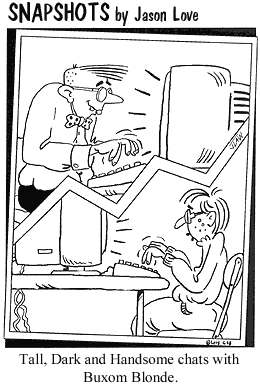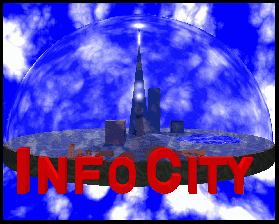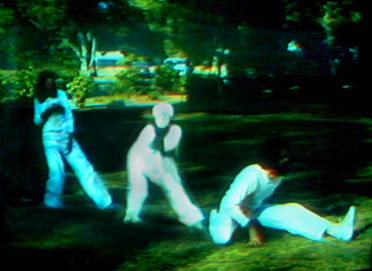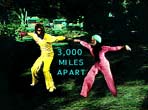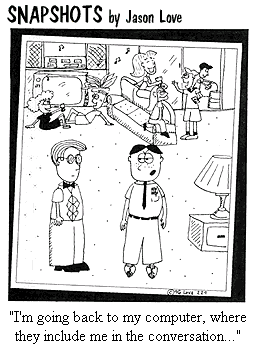 |
Multi-User Interactions |
|||||||||||||||
|
"Mudding: Social Phenomena in Test-Based Virtual Realities" [1992] -Pavel Curtis Categorical breakdown of observations
The mudding population
Player presentation
The Alpha & Omega
MUDs with a theme
InfoCity
|
LambdaMOO is a network-accessible, multi-user, programmable,
interactive system well-suited to the construction of text-based adventure
games, conferencing systems, and other collaborative software.
Pavel has grouped his observations into three categories:
It appears that the educational
background of the mudding community is generally above average and it is
likely that the economic background is similarly above the norm. The
people who have an opportunity to connect to LambdaMOO are not a
representative sample of the world population; they all read and write
English with at least passable proficiency and they have access to the
Internet. Because they have Internet access, it might be supposed that
the vast majority of players are involved in the computing field, but I
do not believe that this is the case. It appears to me that no more than
half (and probably less) of them are so employed; the increasing general
availability of computing resources on college campuses and in industry
appears to be having an effect, allowing a broader community to
participate. One can pick out a few common styles for names for example names from or inspired by myth, fantasy, or other literature, common names from real life, names of concepts, animals, and everyday objects that have representative connotations, etc.
Transvestism (TVism) as a medical diagnosis was probably used for the first time by the German sexologist, Dr. Magnus Hirschfeld, about forty years ago when he published his book, Die Transvestiten.[1] The term is now well known in the sexological literature, indicating the desire of some individuals - men much more often than women - to dress in the clothes of the opposite sex. It is, therefore, also described as "cross-dressing." Most writers on the subject refer to transvestism as a sexual deviation, sometimes as a perversion. It is not necessarily either one. It also can be a result of "gender discomfort" and provide a purely emotional relief and enjoyment without conscious sexual stimulation, this usually occurring only in later life.
The emergence of MUDs has created a new
kind of social sphere, both like and radically unlike the environments
that have existed before. As they become more and more popular and more
widely accessible, it appears likely that an increasingly significant
proportion of the population will at least become familiar with mudding
and perhaps become frequent participants in text-based virtual
realities. We must begin to try to understand these new societies, to
make PernMUSH PernMUSH is a a rigidly-maintained simulacrum of the world described in Ann McCaffrey's celebrated `Dragon' books. All players there have names that fit the style of the books and all places built there are consistent with what is shown in the series and in various fan materials devoted to it.
InfoCity is an undergraduate project designed to influence both the academic and social life of the College of Computer Science. InfoCity focuses on making a text-based virtual reality for the college. Students (both grads and undergrads), faculty, and administration can cooperate in a multi-user, virtual environment. Our community can connect from their dorms, homes, or offices at any time of day or night. Ideally, this environment would provide many things such as advising tools, expansion of office hours to everyone's convenience, and a social climate for members to have informative exchanges of their expertise. |
|||||||||||||||
|
"Welcome to 'Electronic Cafe International': A Nice Place for Hot Coffee, Iced Tea & Virtual Space" [1992] - Kit Galloway & Sherrie Rabinowitz
|
The Original Cafe for the Global Village
ECI Co-founder, Sherrie Rabinowitz is one of
many California-based artists selected to be a part of an important
exhibition at The San Jose Museum of Art.
Internet-Based Education: Some Guidelines The Internet offers many powerful resources for implementing distance education. Internet-based education can take many forms, including: (1) tutorial, (2) virtual classroom, (3) correspondence course, (4) project-based education, and (5) event-based education. Internet-based education can also provide a valuable supplement to more traditional approaches to education. And as Internet technologies develop, more possibilities emerge.
|
|||||||||||||||
|
|
Create the concept of extended collaboration of resources and multimedia networking over the multicast enabled environments, on the model of Access Grid. The users can not only collaborate with each others on the MUD and MOO like environments but they can also communicate in the context of two dimensional remote video conferencing. |

